 The Boy from Lebanon is a thought-provoking and intense depiction of a true story, a plot by Hezbollah to assassinate then-president François Mitterand by using a child. It’s one of the most striking foreign films I’ve seen in the last few years, and it far surpasses “Syriana” in showing how rather ordinary young people become terrorists. But The Boy from Lebanon is a more than a mere consciousness-raiser about the plight of children in war-torn areas—it’s a shocking drama, and an wonderful portrayal of the power of friendship.
The Boy from Lebanon is a thought-provoking and intense depiction of a true story, a plot by Hezbollah to assassinate then-president François Mitterand by using a child. It’s one of the most striking foreign films I’ve seen in the last few years, and it far surpasses “Syriana” in showing how rather ordinary young people become terrorists. But The Boy from Lebanon is a more than a mere consciousness-raiser about the plight of children in war-torn areas—it’s a shocking drama, and an wonderful portrayal of the power of friendship.
Djilali (Teufik Jallab) is a scant eleven years old when he’s sold—literally—into terrorism. Djilali is emotionally shattered, detached, and empty. Even his hatred of “the Jews and the infidels” is something he holds out of duty, and his lack of emotion and whole-hearted dedication to his mission makes him ideal for Hezollah’s purpose.
To get close to the French president, though, he must not only go to France, but meet and prepare to take the place of Karim (Younesse Boudache), a Lebanese-French kid who will meet the president at a Christmas party. Karim, who knows nothing of the plot, is practically Djilali’s direct opposite, an ebullient Huckleberry Finn of Paris’ Arab slums, who hates no one.
To play his role, Djilali must live with Karim for a few days, and the interaction between them is the heart of the film. Djilali regards Karim as despicably frivolous, while Karim sees Djilali as hopelessly out-of-it. The few days they spend together will shatter both of their worlds completely.
Sometimes it gets a bit confusing; shifts between Karim’s French slum and Djilali’s flashbacks are difficult to catch at first, and in my case I had to watch it a second time to understand everything. In addition, the adult actors are sometimes less-than-convincing, but The Boy from Lebanon isn’t about them. The main characters are memorable and masterfully portrayed by these child actors. The director, Gilles de Maistre, is an award-winning French journalist, who presents the characters compassionately, along with a side of Paris that most movies assiduously avoid.
My teacher commented on the Virginia Tech massacre with the observation that Seung-Hui Cho had had no friends, and wondered would he have done what he did if he had. A similar question is brilliantly posed by “The Boy from Lebanon.”
Watch it. You’ll be glad you did.




